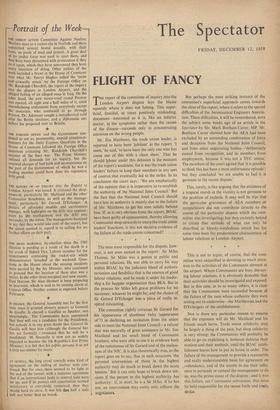FLIGHT OF FANCY
THE report of the committee of inquiry into the London Airport dispute lays the blame squarely where it does not belong. This super- ficial, fanciful, at times positively misleading, document—interested as it is, like an inferior doctor, in the symptoms rather than the causes of the disease—succeeds only in concentrating attention on the wrong people.
Mr. Jim Matthews, the trade union leader, is reported to have been 'jubilant' at the report. 'I seem,' he said, `to have been the only one who has come out of this with a clean sheet.' That he should tabour under this delusion is the measure of the report's weakness; for it was the trade union leaders' failure to keep their members in any sort of control that eventually led to the strike. In its conclusion the court says: 'We are emphatically of the opinion that it is imperative to re-establish the authority of the National Joint Council.' But the fact that the National Joint Council should have lost its authority is mainly due to the failure of Mr. Matthews to get his men solidly behind him. If, as is very obvious from the report, BOAC have been guilty olappeasement, thereby allowing Communist shop stewards to usurp the trade union leaders' functions, is this not decisive evidence of the failure of the trade unions concerned?
* * * The man most responsible for the dispute, how- ever, is not even named in the report : Sir Miles Thomas. Sir Miles was a genius at public and personal relations. He was able to carry his way within BOAC by the judicious blend of authori- tarianism and flexibility that is the essence of good labour relations; and he made it under his leader- ship a far happier organisation than BEA. But in the process Sir Miles left grave problems for his successor, whoever he might be; and the choice of Sir Gerard D'Erlanger was a piece of really in- spired miscasting.
The committee rightly criticises Sir Gerard for his 'appearance of aloofness' (why 'appearance of'?) in declining an invitation from the union side to meet the National Joint Council—a refusal that was naturally of great assistance to Mr. Jim Maitland and his small band of Communist brothers, who were able to use it as evidence both of the remoteness of Sir Gerard and of the useless- ness of the NJC. It is also theoretically true, as the report goes on to say, that in such occasions 'the personal intervention of those in the highest authority may do much to break down the acute tension.' But it can only hope to breakdown ten- sions if the person in the highest authority has authority : if, in short, he is a Sir Miles. If he has not, an intervention may easily only inflame the negotiators. But perhaps the most striking instance of the committee's superficial approach comes towards the close of the report, where it refers to the special difficulties of the Aeronautical Engineers Associa- tion. These difficulties, it will be remembered, were the subject some weeks ago of an article in the Spectator-by Mr. Mark Bonham Carter, MP. Mr. Bonham Carter showed how the AEA had been excluded by an astounding combination of force and deception from the National Joint Council, and from other negotiating bodies—`deliberately ousted from recognition, and its members from employment, because it was not a TUC union.' The members of the court agreed that 'it is possible to think this has been a most unfortunate episode'; but they concluded 'we are unable to feel it iS germane to the recent dispute.'
This, surely, is like arguing that the existence of a tropical marsh in the vicinity is not germane to the problem of malaria. It may well be true that the particular grievances of •AEA members or sympathisers did not contribute directly to the course of the particular dispute which the com- mittee was investigating; but they certainly helped to create that attitude of what can only be described as bloody-mindedness which has for some time been the predominant characteristic of labour relations at London Airport.
This is not to argue, of course, that the com- mittee were unjustified in devoting so much atten- tion to the activities of the Communist element at the airport. Where Communists are busy disrupt- ing labour relations, it is obviously desirable that their activities should be investigated and exposed. But in this case, as in so many others, it is clear that the Communists were successful because of the failure of the men whose authority they were setting out to undermine—the Matthewses and the D'Erlangers of the establishment.
Nor is there any particular reason to assume that the exposure will do Mr. Maitland and his friends much harm. Trade union solidarity may be largely a thing of the past, but shop solidarity is very strong; the Communists will probably be able to go on exploiting it, however dubious their motives and their methods, until the BOAC estab- lishment learns how to put its house in order. The failure of the management to provide a reasonable and easily understandable basis for agreement on 0.edundancy, and of the unions to use their influ- ence to persuade or compel the management to do so, was the prime cause of the dispute : and it was this failure, not Communist subversion, that must be held responsible for the recent futile and costly strike.






































 Previous page
Previous page